Text

I just can't overemphasize how fucking weird this is
106 notes
·
View notes
Text
he’s a vampire he’s an orthodox christian he’s catholic he’s a satanist he’s ukrainian he’s italian he’s a theatre owner he’s a cult leader he’s a slave he’s a renaissance artist he’s a victim he’s a predator he’s a lover he’s a demon he’s beautiful like an angel he’s disgusting like a worm. i didn’t say his name but you thought of him didn’t you
#hes sooooo#armand#tvc#the vampire chronicles#what a guy#hes 500 years old hes a teenager who never grew up
580 notes
·
View notes
Text
armand the worshipper armand the follower armand the child the monster the abused the distant the holy the hungry so so hungry eternally hungry for love and understanding and safety armand who wished away eternity with his soulmate because he loved him too much who lost him to that very same eternity who even after 500 years is misunderstood and alone and taken advantage of by people who promised they’d take care of him who has followers and devotees never lovers who’s forced to be the strong one the powerful one the one in control because that’s what he knows and that’s what others know of him and if he lets anyone in they might kill him but being alone might kill him too
#god i really cannot. character of all time#jumping off a cliff over him :)#tvc#the vampire chronicles#armand#ignoring anne’s horrible intents armand is truly a very good example of how childhood trauma and abuse warps you#like. it’s about the desperation for love and the unawareness that you can only make it worse because you don’t know how to love normally#just. fuckkkkkkk. andrei amadeo armand the character of ever
423 notes
·
View notes
Text
armand according to louis: sexy professor with a knife and handcuffs on his belt
armand according to claudia: mob boss sending you bullets in the mail
armand according to daniel: if the predator from predator was a manic pixie dream girl
armand according to lestat: screaming baby clinging to your leg but his eyes are completely black
#accurate#all of these are correct as well#he contains multitudes#love him#armand#tvc#the vampire chronicles
210 notes
·
View notes
Text
The poll idea via @sillylotrpolls, thank you for the inspiration!
I will say that only their first name counts, and you have to be able to recall it at least somehow similar to the canonical spelling. Unnamed characters don't count. If a character has multiple names, only one counts. If two characters have the same name, differentiate which one you mean. Please. Include all characters from all works I'd love to see what we all come up with! If anyone actually gives this a try before voting I will owe you any favor! *edit: duplicates are fine, and you don't have to stop or anything if you write one, they just don't count.
the roman daddy will fuck you if you do this i swear
#50 from memory#and ive only read the vampire chronicles so this isn’t including all her works#im quite impressed with myself#anne rice#tvc#the vampire chronicles
21 notes
·
View notes
Text








iwtv + text posts part 49
368 notes
·
View notes
Text
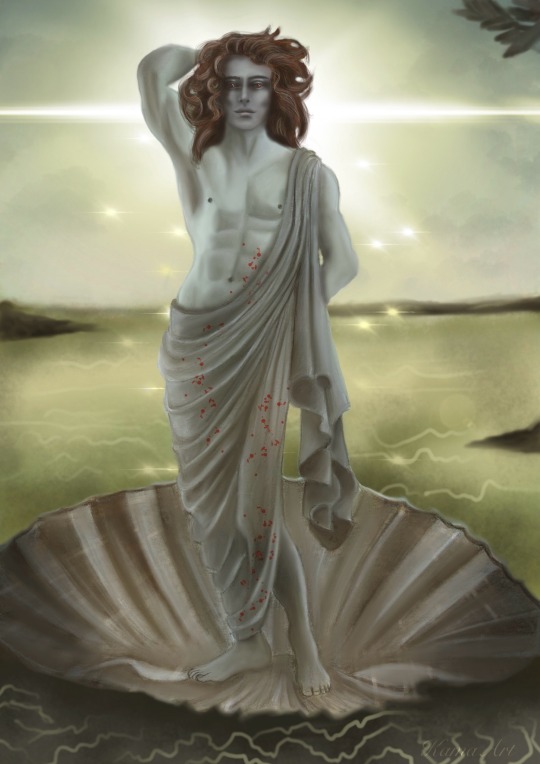
1.Venus as a boy
Armand painted by Marius in his Botticelli~Phase. He could not stop to show him as a virgin venus or the black winged angel - (Even if he knew the innocence of his russian lover is long gone).
Most time it ends in a mess of naked bodies, oil colors and blood. Armand always teases the older one till the Roman Blonde gets hot as hell…
47 notes
·
View notes
Text
girlhood is touching your necklace whenever you feel nervous
#me#also daniel molloy DM era#the blood amulet will always be famous#daniel molloy#devils minion#armandaniel
26K notes
·
View notes
Text

Venus as a boy
63 notes
·
View notes
Text
Armand surgical malpractice meta (spoilers for TVA)
It’s, at least from what I’ve seen, a pretty popularly agreed upon conception that Armand’s mutation of Claudia b4 her death as described in TVA didn’t actually happen..partly bcus it’s such a drastic and grotesque retcon from her death in interview with the vampire so lots of ppl don’t want to address it as canon, and partly bcus it’s so bizarre and seemingly unprompted in context that it just seems more plausible that Armand would make this up as some sort of twisted shock value rather then actually do it. I used to buy into this theory and never rlly thought about it beyond that, and today for the first time I thought about it deeply and realized. Damn I rlly disagree! I think that Armand 100% canonically chopped Claudia’s head off and sewed it onto an adult body. I believe it happened as told. And I have many reasons !
First and foremost I don’t think that Armand is actually capable of lying so deliberately in this context. Interpreting most tvc narrators as potentially lying to our faces and intentionally twisting events to suit a narrative and a purpose of dictating our perception of them is, I think, accurate and justified, and smth I love about this fandom. Everyone is not to be trusted 100%, especially Louis and Lestat, who are said and implied many times to have completely fabricated some events in the books for the sake of painting a picture. Tvc serve as this over arching plot about multiple conflicting characters manipulating events of their lives to suit a narrative that we as the audience can pick apart and discover the truth within. Very much “this bitch said WHAT about me?? that dumb cunt is always spreading lies smh, it actually happened LIKE THIS” (they r both not telling the full truth). Armand however is very much an outlier here, and it’s part of what makes TVA so unique as a chronicle. It’s a big part of his character throughout the series, in TVA and leading up to TVA, that Armand’s way of thinking is so dysfunctional and his memory is so flawed (bcus of all his trauma) (and neurodivergence) (imo) that he isn’t able to fully conceptualize the events of his life as chronological and meaningful in the way that one would need to do to be able to write a memoir.
He can’t describe events in broad strokes, or wrap his head around a vast emotional impact in a way that is explanatory or intentional. Think of that conversation he has with Daniel in queen of the damned, where he explains that he isn’t capable of telling Daniel what his life in the past “was like” because that’s a concept incomprehensible to him. He only knows what happened, not what it was like, not how it affected him or how it shaped his personhood, what it means etc. It’s a form of dissociation almost. The vampire armand is the first time in Armand’s vampiric life that he self reflects beyond acknowledging events and his emotions in that moment, it’s the first time he attempts to make connections and understand himself in a way that is narrative and structured and not fragmented bits of history and A names. Part of this requires further dissociation. I definitely get the impression that since Armand is being so vulnerable in a way he is so unused to, yet is so significant, he is unable to register while he’s talking that not only David, but millions of people including every vampire in the world, will know what he says. He’s just laying himself completely bare, he’s talking and talking and only once he finishes realizes oh. Oh. everyone’s going to read this huh. It’s so cathartic he doesn’t consider that in the moment. It’s the first time he’s ever been capable of reckoning with his life in a self reflective way, of looking at it and explaining it and reasoning with it, structuring it in order, not fragments, etc, seeing the cause and the impact and touching on an overall conclusion (tho he never entirely gets there). These baby steps are so difficult for him already, and considering this part of his character I really think it’s a stretch to say that Armand would be capable of the thought process in his book of pure venting to go “maybe I should twist the truth here or change this or add this or lie about this so people will think of me this way or so Lestat can see this, etc” TVA is unreliable, more so bcus of how mentally ill armand is and how little he understands his own life and emotions, but not deliberately like iwtv and tvl. Armand even says that the book was for Benji and Sybelle, but it’s so unfiltered and horrific and vent-like that this sounds ridiculous. He doesn’t even have his stated audience in mind while he’s telling his story, let alone his broader audience. The audience was a complete afterthought, a barely registered consequence. So why would he lie about Claudia? How would he be capable?
it’s another common piece of conversation around this part of TVA where we go, Armand discusses how he never would want to tell this to Louis bcus he knows how badly it would hurt him, so why did he describe it so graphically? Well, cause of all I mentioned. It seems pretty clear to me that armand is almost haunted by the affair with Claudia, and he has no way of lying about this, so his descriptions seemed very much to me like a desperate bit of venting. He has never told anyone how horrific it actually was and it’s always been in his mind, so he just lets it all out. Makes sense, but the broader question is, if Armand wasn’t lying…why did he do that at all?? This I think is so interesting.
To understand this I had to think a lot about Armand’s motivations for killing Claudia at all, which is well, simply, revenge against Lestat and claiming of Louis without barriers. If Claudia dies Lestat will be sad and Louis will be mine and mine alone 👍👍 etc. but Claudia’s mutation was not rooted in either of these motivations, which is part of why it’s so shocking. He didn’t do it to hurt Lestat, lestat never found out. It just seems so odd and unprompted. But once I thought more about why Armand hates Lestat, and why he wants to hurt him by killing Claudia, it started to fit into place. Armand’s hatred for Lestat is rooted very much in his twisted resemblance to Marius that he perceives as being very strong and basically mocking. When he first sees Lestat in tvl he’s repulsed by him instantly bcus he sees him as this parody of Marius, this beautiful blonde man in striking red robes who boldly and carelessly defies the laws of vampires established by the children of Satan as if they are meaningless to him, revels in the indulgent world of humans like he belongs there, shamelessly as armand devotes himself to miserable repression. It strikes a nerve for armand, feels very personally offensive to him, like the embodiment of the traits that got Marius’s destroyed r coming back to mock him in his face. And then as he gets to know Lestat more deeply he only hates him more, bcus Lestat is not only bold and careless, but he’s immature and stupid, and he knows nothing. Armand in his horribly traumatized mind set registers Lestat as “like Marius” and takes this to mean “maybe he can save me, maybe he will teach me and free me from this hell, guide me and give me the purpose I need to be given.” But Lestat does not do this, lmfao. He actually destroys any sense of purpose armand had, rips him from his safety net, and when Armand begs for guidance, asks to be allowed to travel alongside Lestat so he can learn to be a person again, Lestat denies him. The only purpose he bothers to give him is the scraps, symbolic of his perverse indulgence that Armand despises, and fucks off. Lestat is grotesquely reminiscent of Marius, in the worst ways. It’s like his presence alone opens Armand’s eyes to how badly Marius has ruined him. He was the sun, the purpose, the guiding light, and then it was ripped away, and there was nothing else without him. Just a void.
So Armand hates Lestat for this very personal mockery of his own plight, and this hatred spirals into unbridled rage when Lestat returns to him and expects Armand to give Lestat the assistance that he denied him. Not only this, but Lestat found Marius, found marius and was granted guidance and love that Marius refused to give Armand after his indoctrination into the children of Satan. And Marius told Lestat to never ever do what he did, never make an Armand, because Armand was a mistake, he was too young to be a vampire, and now he’s a mistake he will never forgive himself for. And with this immense privilege that Armand spent a huge chunk of his life yearning for, guidance from Marius when he was his most lost, Lestat decides to disregard it. He decides that since Marius said it was bad to turn a child as young as Armand, he’d turn a child even younger then Armand, just cuz. He is once again the embodiment of Marius’s sins, the grotesque parody. Marius turned a teenager, Lestat turns a five year old. It’s almost cruel in how mocking it is, almost intentional in how personal. So Claudia is this child, this deliberate mistake made by someone who knew her turning would be harmful to her but was selfish enough not to care, then went on to regret it when he has to reckon with the consequences. Seem familiar? Armand sure thought so. So I imagine that being alone with Claudia, looking this deeply sad reflection of his own agony in the eyes, knowing she is about to die for justice against a warped parody of his Maker, for the sake of punishment for her own existence, I imagine this struck a cord of insanity in Armand’s fucked up mind, caused him to loose his absolute shit for just long enough to go what if I can fix her, what if I can turn this narrative around, give her the remarkable ending I know deep down that she, I , will never be granted. What if I can give her a body that will reflect her mind? What if I can make this abomination into a miracle? No wonder he pulled out the surgical tools 😭 No wonder he was so horrified by his own actions when he came to his senses, no wonder he refused to share this, kept it to himself for so long, until he finally broke and confessed it all in a desperate moment when he was too caught up in the dam breaking to realize he’d be exposing this horrific action to the world.
Armand sees Claudia as a repulsive mistake that should’ve never existed made by Lestat to deliberately mock him up until the surgery, when then for only a moment lost to time ended in blood she is another child who had her life taken from her too soon by an egotistical blonde man who thought he could play god with someone’s life. “They were done for anyway, he was going to starve to death in a brothel, she was going to die as a street orphan, the blood would be a service to them, a chance they never had” But they both know that’s a lie they tell themselves to justify the act of taking a child and molding it into what they please for fun, for pleasure, for companionship, just to see what would happen. Armand sees this for a moment and wants to give her a chance, give them both a chance, wants to see her as an adult, as someone who could have a life. And then of course, we know how that turns out 😭
#oh my god#beautiful heartbreaking and absolutely something i agree with#i really do believe that surgery did happen and you explained perfectly why#because WHY would armand lie about it? what would he gain from lying about doing it#that would be more than he would gain from actually doing it#if anything at all#and his motivations for doing it at all MAKE SENSE#lots of talk that armand hated claudia but not enough about how he may have seen her as a parallel of himself#lestat and claudia are a worse version of himself and marius and he can SEE IT#bursts into tears#I GET IT. I GET IT.#plese i wish he and claudia got to have ONE conversation. just child vampire to child vampire#claudia de pointe du lac#claudia de lioncourt#claudia#armand#meta
147 notes
·
View notes
Text
Armand and the Romani
I’ve mentioned many times now that I think it would be really interesting and fitting if Armand in the show was Romani and that’s my personal interpretation of his character until proven otherwise. I don’t think it’s necessarily very likely going to be canon, especially when writers rarely remember Romani people exist, but like I’ve said this is like the only show in the world I think could be smart enough to understand how deeply the history of race and racism in Europe (which we know they’re going to address) is intertwined with the history of the Roma people, so you never know. I’ve seen an interesting theory that Armand could be a Tatar and I think that’s the most likely route they’re going to go, but I think him being Roma or some other ethnicity is still a possibility. Furthermore, because of the Roma people’s unique history he could actually be both Tatar and Roma at the same time, especially if he’s from Ukraine like in the books (more on this later). I wanted to elaborate on why Armand’s character and IWTV in general resonate with me so strongly, why I think Armand being Roma could bring a lot to the show and fit thematically, and how if Armand had a Roma background it would influence the way he acts.
Just as a foreword this post is long as HELL as I’ll be talking about Roma people with an assumption that most readers don’t know much about them, and it involves heavy generalization by necessity. I want to emphasize that Roma people are a very heterogeneous group that have very diverse experiences and practices depending on where they live, my experiences don’t apply to all Roma, and I’m not speaking for all Roma. I don’t know much about the Roma in France or Ukraine (which would be relevant for this conversation) other than what google can tell me and I don’t really trust it because much of the information you find on the internet is written by non-Roma people. So when I say something is a part of Roma culture, I mean really that it’s in my subjective experience a part of the traditional Roma culture in my country. The customs may vary a lot even between families in a same region, and the modern Roma and those with mixed ancestry (like me) don’t always follow traditions. I feel I need to stress this because there are a lot of (often negative) misconceptions of the Romani and I don’t want to further contribute to them or just replace them with different misconceptions. Content warning for discussion on sexual and racial violence and the Holocaust.


*
The history of the Roma people
The Romani (also called Roma, Rom and other variations) are a traditionally nomadic ethnic group originating from the northern India. The Roma are often confused with other itinerant people like Irish Travellers and the Yenish but are a separate group. Note also that the word ‘gypsy’ is considered pejorative and most Roma people dislike being called that, and the Roma have nothing to do with the country of Romania, the names are etymologically unrelated. The Roma people are divided in many different subgroups, and many facets of the Roma culture are easier to understand if you know that it was originally a clan culture like many nomadic cultures.
The Romani diaspora has spread to everywhere in the world (the biggest Roma populations are in U.S and Brazil) but is the most concentrated in Europe where they came through Persia in the Middle Ages, with most European countries today having a Roma minority of 0,5%-8%. The Roma population is estimated to be 10-15 million, but nobody knows for sure because many Roma aren’t included in censuses, many Roma people choose not to disclose their ethnicity due to discrimination, and some people who have Roma parentage don’t identify as Roma. The Roma identity is strongly tied to the community. A person who’s adopted or marries into a Roma family may in some cases be considered Roma regardless of their ethnic background, and an ethnically Roma person who doesn’t have connection to the Roma community and doesn't follow traditions might not be considered a real Roma (in practice the latter situation is much more common than the first one). This is relevant when talking about someone like Armand who if we follow the books was taken from his family when he was young and adopted by a white man. Regardless, the Roma are Europe’s largest ethnic minority. I don’t think statistics really matter in a fantasy horror show but it would be the most likely scenario for someone with Armand’s appearance who was born in the 1500s Europe to be Romani.
I assume the show Armand’s character and story may be largely similar to the books based on what we’ve seen, him just having been older when he was turned into a vampire, though it's unclear is he still from Ukraine. In the episode 2 we see him refer to his prayer in a language that Daniel thinks is ‘Kazakh, or 'somewhere in the Crimea’. Wikipedia suggest that it’s actually Uzbek, though we don't know does it mean Armand is definitely from Uzbekistan. Regardless, him using this language without even thinking when talking about his praying makes me think it may be his mother tongue, and we’re probably meant to think that he’s from the Eastern Europe/Central Asia region. I’m personally suspecting he could still be from the Ukraine region like in the books considering they had Daniel think of Crimea. Him using the name Armand Marius in France which is essentially a patronym also makes me think that he could be from a Slavic country. If he was Roma or from other nomadic tribe he could’ve also easily spent time in several countries. Although there is Romani language that is related to Sanskrit, most Roma speak as their native language whatever is the majority language where they live. Many Roma speak multiple languages, especially if they’re nomadic. From what we’ve seen of Armand speaking, Assad does a great job at making his accent vaguely sound like many different accents but not quite like any of them.
One of the ways the Roma are a unique group is that they’re one of the very few ethnicities in the whole world that don’t associate themselves with any country or place. Typically, even other nomadic peoples have some distant homeland or place they see themselves as connected to. The Roma don’t feel connection to any specific country or place; they have no homeland and they don’t want one either. Although in people’s perceptions the Roma are practically synonymous with free-spirited wanderers, most Roma in the modern time are sedentary, and historically when the Roma people have wandered it has often been because of persecution or trying to make a living, not by choice. Freedom and independence are important values for the Roma people, but more in the sense of being allowed to be themselves and live how they want, not necessarily physical roaming. It’s much more common for Roma people to dream of stability and having a home and secure job than of being able to wander.
Many of the perceived modern problems among the Roma can be traced to the change of work and industry from the late 1800s to the early 1900s. The industrialization and urbanization made most traditional Roma professions such as blacksmiths, craftsmen, horse traders, animal trainers and travelling salesmen and entertainers obsolete. Even though there was always prejudice against the Roma they also used to be respected for their expertise on those areas and there was positive interaction with the majority population too. Then suddenly they lost the chance to practice their old professions but lacked societal and monetary capital to learn new ones, which led to mass unemployment and poverty that still exists today. This not fitting in the modern society is a common Roma experience. In the books I feel this is reflected when the vampire characters seek ways to connect with the modern world and humanity. Armand sees Louis as such possibility, but as he in the end tells him ‘You are as cold and distant from me as those strange modern paintings of lines and hard forms that I cannot love or comprehend.’
The Roma people are defined by the dichotomy of being perpetual outsiders who never fully integrate anywhere, and on the other hand being chameleons who adapt anywhere. They often adopt the customs, language and religion of the majority population, while maintaining their own. The Roma have likely been in Europe for at least thousand years, and the earliest records of them are even older. Despite this the Roma have arguably never been fully a part of any wider society or fully accepted. It can be talked about the Roma society rather than just the Roma culture, because the Roma people often form almost a separate parallel society wherever they live. It’s common that the people from the main population don’t have any Roma friends while the Roma people don’t have any friends in the majority population, and the Roma may have little interaction and connection with the wider society. The Roma have been ostracized, but because of this long ostracization the Roma also don’t trust in the society around them and may try to limit their interactions with the majority population. As a Roma you can feel like you live behind a veil that separates you from the rest of the world and you can’t really touch and see each other. Many Roma experience the sense of profound loneliness and of rootlessness, a feeling like you don’t have the past or the future and nothing really matters. Everything above makes Rice’s melancholic, drifting, existential vampires very relatable to me.
The Roma people have been and still are associated with crime, dishonesty, uncleanness and supernatural. The Roma have often been accused of witchcraft, satanism and stealing children. Depending on the time and place people have tried to either banish or forcibly assimilate the Roma. In many countries it was legal to kill a Roma person without impunity. Historically The Roma have often been slaves or otherwise forced into labor or prevented from moving freely. For example, in Romania the Roma were kept in chattel slavery for centuries over 500 years until 1860. The first Roma in America arrived there as slaves too. Interesting in the context of the show, Spain sent Roma slaves to their Louisiana colony and at least according to Wikipedia there is an Afro-Romani community in St. Martin Parish due to intermarriage of African American and Romani slaves (I would’ve been interested to read more about this but couldn’t find much online sources). In the books Armand was abducted by the Tatars to be sold as a slave. Nowadays the term Tatar is used for different Turkic ethnic groups, but historically it was used to refer to anyone who came from the Northern or Central Asia (Tartary). The Roma people were also commonly known as Tartare/Tattare, as they came from the East too. Coincidentally some Roma are thought to have arrived in Europe as slaves of the Tatars or the Mongols. At the same time the Crimean Roma and the Crimean Tatars have a very close and unique history to the point that the Crimean Roma are commonly considered a subgroup of the Crimean Tatars. So it would actually be possible that Armand is both Tatar and Roma, especially if he comes from that region!
2. The Romani culture and relations with other people

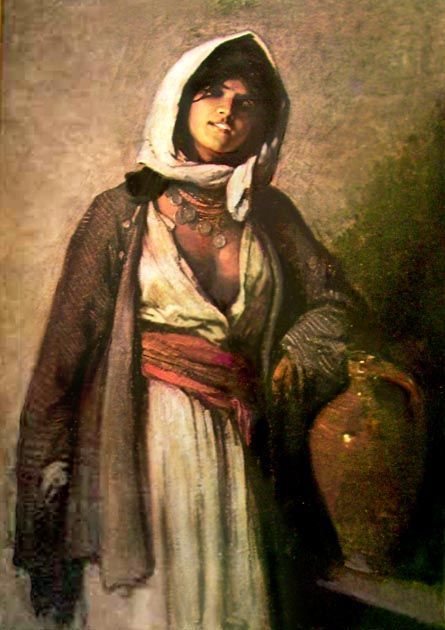
The Roma people are often highly fetishized and oversexualized, and viewed as promiscuous and manipulatively seductive, which can also be seen in how Roma characters are depicted in popular culture. Roma people continue to be victims of sexual assault and trafficking at very high rates. Roma women are often assumed to be prostitutes or sexually available. When you see news about human trafficking in the Eastern Europe, both labor and prostitution, the victims are often Roma even though it's rarely mentioned. Many consensual sex workers are also Roma, but most of them likely wouldn’t be sex workers without poverty and if they had other opportunities. Roma children experience sexual abuse much more frequently than children of the majority population, and they're often viewed as more mature and manipulative than they are. This all reminds me of how in the books Armand was sexualized by nearly every person he comes across even when he was a child or teen. Taking Roma children from their families to exploit them or to assimilate and ‘take the gypsy out of them’ in one way or another has always been common, nowadays this often happens in the guise of child protection. Here in Finland even 50% of the Romani children in 1950-1980 were placed in state care institutions, and this continues to happen in many countries. The less fantastical version of what Armand went through with being abducted and sold and exploited by everyone including his ‘savior’ who tried to sanctimoniously civilize him is what has happened to countless Roma children over the centuries.
The traditional Roma cultural practices can be considered (when heavily oversimplifying) to be built on three pillars that are connected to each other: respecting elders, concepts of purity and impurity, and honor and shame. Most cultures probably consider respecting old people important but in the Roma culture this is deeper and more extensive than usual. Older people are treated and spoken to with very high respect, people often address even their own parents with the formal ‘you’. Being older is on itself seen as a sign of authority and younger people must always listen to their elders. This respect shows up in everywhere in daily life in both practical and symbolic ways, older people take the food first, if the house has more than one floor the younger people don’t live in the rooms above older people, shaking hands with or sitting next to an older person may be considered inappropriate because they imply an equalitarian relationship etc. It’s very difficult for a young Roma person to say no to an older person or express anger or anything that could be seen as disrespectful. The Roma culture has anarchistic qualities because the Roma don’t necessarily acknowledge the state’s authority, and intracommunity hierarchies are quite fluid and decentralized, but the older people’s higher status over the young ones is seen as obvious and natural.
Cleanness is another aspect that is very central to the Roma culture, in both literal and symbolic sense (ironically, since the Roma are often seen as dirty). The Roma don’t expect non-Roma to follow or even be aware of their complex system around it (mentioning this because I know some people fear that they accidentally offend Roma if they do something wrong lol). The Roma consider the body above the waist ‘pure’ and below it ‘impure’, and things that touch them are kept separate, and all objects are categorized according to their perceived cleanness. For example, when you come from the grocery store the shopping bag can’t be put on the floor or chair, you can’t sit or lean on the table, hats and shirts are not put on chairs, if a kitchen utensil falls on the floor it may be thrown away instead of washed because it’s now considered unclean etc. Kitchen is the purest place and is kept as clean as humanly possible. The clothes of men and women and people of different age groups are washed separately. When a Roma person grows old they become ‘pure’, and people are particularly considerate not to tarnish them, for example a younger person can’t sit on an older person’s bed and if they sleep in the same room their feet can’t pointed at the older person’s direction. In some circumstances an impure person may be temporarily or permanently banished from the community. The importance of cleanness in the Roma culture goes back to preventing illness in the traditional nomadic lifestyle, and it’s speculated possibly to even further in history in India where the Roma people’s ancestors’, the lowest caste Dalits, responsibility may have been to handle corpses and other unsanitary jobs.
Contrary to the stereotype the Roma are usually highly modest and anything ‘below the navel’ stuff (sex, pregnancy, periods, bodily functions) is rarely discussed. The Roma men and women don’t talk about them at all with each other if they aren’t a couple, and parents don’t usually talk about sex or dating with their children. Casual sex is disapproved. Oral and anal sex are considered unclean. Although Roma people often marry very young (sometimes underage) it’s usually with people of the same age group, people of distinctly different generations having romantic or sexual relations or even talking about sex with each other is a taboo. For example, if there’s something sexual on television the younger people may leave out of respect if there are older people in the room. A pregnant woman may hide it even from her own parents. Much of the Roma customs focus on ‘keeping face’ and maintaining respectful relations with the other Roma and their surroundings and avoiding anything that would bring shame, and this shame can touch the whole family.
Now if we come back to Armand, if he’s a Roma that adds a new aspect to his trauma, especially pertaining to sexual abuse and his relationship with Marius. Sexual abuse and grooming like that are hard to for any child to process, and especially difficult and confusing it would be for a Roma child, when in the Roma culture older and younger people even talking about sex is seen as offensive and older people’s wisdom and authority are seen as absolute. When in the Roma culture sex itself is taboo and wrong kind of sexual activity can make you ritually unclean it would further worsen the trauma that started from his kidnapping and cause immense shame. Since the old people are considered purer than young people a Roma child might also feel like they’re soiling the sexual abuser and blame themself. Death and touching dead bodies is considered unclean as well; a vampire would always be ritually impure. The way Armand is exposed to sex in Venice is pretty much the polar opposite of how sex is treated in the Roma culture. In the books we see Armand struggle with his complicated feelings about Marius and how he resents him but can’t still stop loving him and seeking his approval, or often can’t even express his negative feelings openly. I think it sounds familiar how many Roma people want independence but still feel obligated to respect their elders even if doesn’t always feel right.
I think this respect for elders also shows in how Armand treats Daniel in the show. He’s quite polite towards him and very considerate in trying to make sure he’s comfortable. Although Armand is in his servant disguise for most of the season 1, he notably keeps talking to Daniel in a pretty similar way after he drops his disguise. This maintaining the appearance of respect even when you’re angry at the older person is typical for Roma people. Armand is chronologically much older than Daniel, but Daniel is still physically an elderly person which is seen as automatically deserving high respect in the Roma culture. Armand and Daniel possibly having some sort of romantic relationship in the past complicates their dynamic.
3. The Romani from the WWII to now
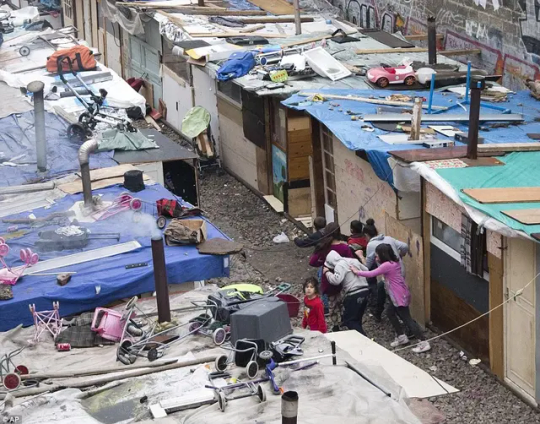
It's hard to convey how extreme the prejudice and hate towards the Roma people is still in the 2020s Europe. Majority of people have highly negative views on the Roma. In the polls most respondents say they don’t want to work with or employ Roma people and wouldn’t want their child to date anyone who’s Roma. Majority of the Roma live below the poverty line, often in segregated slums around cities or villages in countryside, many of them without electricity or running water or access to other basic services like healthcare. Depending on a country the life expectancy for Roma people is 7-20 years smaller than for the majority population. Housing for Roma people has been a big problem for a long time, with many Roma being homeless or living in subpar settlements that the officials often destroy and force Roma to move. Nobody wants to rent or sell to Roma people or be their neighbor, so the Roma population often segregated from the majority population. Illiteracy is still common. Many Roma children don’t go to school; if they do, they’re often put in special classes or special schools where they’re separated from other children and receive substandard education. If they receive proper education they can’t get a job because nobody will hire Roma people. Many companies and places refuse to let Roma people enter. Hate crimes and police violence are common. As a Roma you can feel like you’re leprous, nobody will talk to you or come close to you.
Typical for anti-Romani racism is that people don’t see it as real racism and consider it justified and something that Roma people deserve. There also isn’t much difference how left-wing and right-wing people view Roma. Racism against Roma people is widely accepted and normalized regardless of political affiliation. In Europe the Roma are singled out and many people who aren’t (at least on conscious level) racist towards other ethnicities still despise Roma people. A case that has stuck with me and I feel embodies how the Roma are dehumanized is from Naples, Italy in 2008 where the beachgoers continued their day sunbathing and picnicking near the bodies of two drowned Roma girls. Though anti-Roma racism exists everywhere, it’s where the European hypocrisy is its most obvious. The Europeans often talk about the history of racial segregation, slavery and ethnic cleansing in other places like it’s something distant and absurd to us, when systematic segregation continues to be everyday to Roma people here in the present day.
The position of the Roma people is unique because much of the discourse around racism in Europe is focused on immigration and assumptions that people of color always come from 'somewhere else', but the Roma’s ancestors have often been here as long as the white Europeans’ ancestors. Racism against the Roma people predates the modern concepts of race, scientific racism and the modern imperialism and colonialism. The Roma are a large group that certainly hasn’t been living in an isolated bubble separate from the rest of the world and they’ve had a significant influence on the Europe’s culture, but they and their suffering are often invisible and many people are completely ignorant of it. The Roma have oral tradition and there are few Roma politicians, journalists or scholars so they lack platform to make their issues known. The Roma have become a sort of permanent underclass in Europe.
We know that the s2 takes place in the 40s in the immediate aftermath of the WWII and deals with it in some capacity. The hatred towards the Roma people can be seen as having culminated during the WWII when anywhere from 250,000 to 2 million, or 25% to 80% of the European Roma were killed during the Holocaust. The figures vary so much because the Romani genocide is severely understudied, we don’t know how large the Roma population was, and there weren’t as meticulous records of the Roma victims as there was of the Jewish victims. The Romani genocide (sometimes called Porajmos) has often been treated as an afterthought but for the Roma people it was absolutely devastating. The Roma were classified as racially inferior and were killed in concentration camps and in shootings by mobile killing squads. Roma people were often sterilized and used for medical experiments. In some countries like Croatia and the Netherlands practically the entire Roma population was destroyed.
After the war there was little sympathy for the Roma. Many Roma became stateless refugees, and Germany didn’t acknowledge what happened to the Roma as genocide until decades later, which prevented the survivors from seeking restitution. The post-war trials didn’t cover the crimes against the Roma people. Attempts to assimilate the Roma and wipe out their culture continued in many countries. There still isn’t widespread acknowledgement and understanding of the Romani genocide and how it’s a direct cause for the Romani people’s current situation, even within the community. Deep poverty, illiteracy and lack of education and social institutions has led to there not being full consciousness and collective memory around the Holocaust among the Roma like the Jewish people have.
What happened to Roma varied a lot from country to country. France has always been rather hostile to the Roma, and it was also a ‘forerunner’ in the modern racial discrimination against them because it started to register Roma in the early 1900s and giving them ID cards that categorized them differently from other travelling workers. During the World War II some French Roma were deported to nazi-run concentration camps like Auschwitz, but most were detained in internment camps in France that were created under the nazi authorities but run by the French authorities. Although not technically extermination camps, their living conditions were similar to concentration camps and thousands of prisoners died from disease and hunger. After the German occupation ended the internment camps stayed in operation until 1946, two years after the liberation. The special Roma ID cards were used until the late 60s. Some people have noted how in the show Santiago seems to work as the ‘front’ for Theatre des Vampires while Armand stays in the background. I think it’s likely related to their races in any case, but this arrangement makes sense especially if Armand is Roma because it would be very diffcult for any company or organization to be openly led by a Roma person in France during the WWII, and the years preceding and following it. Even in the 2020s many people and companies refuse to do business with Roma people, and back then it would’ve been dangerous. Also, whether Armand is Roma or not, many people are probably going to assume he is when seeing a South Asian looking French man, so that’s going to be in subtext regardless.
I think all this would make Louis strongly sympathize with and relate to Armand – and also to see him as more vulnerable and less dangerous than he really is. However, Armand might not see the things in the same way. After Louis is turned he still feels on personal level engaged with what is happening in the society and feels anger over injustice and continues to see black people as his people even when he becomes increasingly distanced from the community. But when a Roma person is taken away from the Roma community they’re not necessarily perceived as Roma by other Roma or even themselves. You might never become a part of the wider society either, you just become ‘no one’. Armand might not think of Roma as ‘his people’. Because the Roma already see themselves as outcasts and separate from the rest of the world and people, for someone who becomes a vampire that could mean complete emotional disconnect.
Perhaps because the Roma perceive themselves as separate from the wider society, it’s not typical for Roma people to be interested in politics or activism or influencing the wider society at all. This is a big generalization because of course there are Roma activists and Roma organizations, especially since the 70s, but by and large Roma people tend to be more or less apathetic towards politics and analyzing the forces behind it. Many Roma don’t vote (and needless to say many countries make it difficult for them) or participate in politics in any way. Political movements, rebellions and revolutions mean nothing to the Roma people. Every so-called revolution or change either has had no influence on the Roma people’s life or made it worse. The Roma people don’t trust non-Roma people, and the organizations and movements have usually been uninterested in involving Roma people anyway. As someone who is interested in politics and activism when I try to talk about stuff with any other Roma person I often get a ‘why does this matter’ or ‘what does this have to do with us’ reaction. The Roma are very used to their situation because they can’t remember or imagine it ever being different, and they often have an attitude that could be described as ‘it is what it is’. Armand might not feel similar anger Louis feels. Armand’s indifference and distaste towards societal institutions is reflected in the books too:
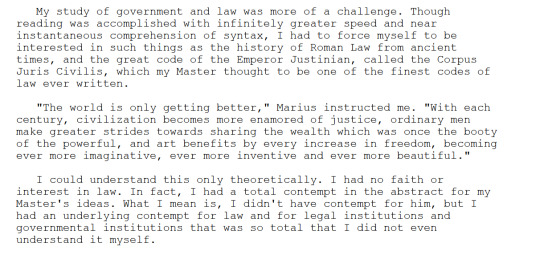
Armand would also perceive his own and Louis’ race differently than Louis does. For the Roma the world consists of people who are Roma or non-Roma (Gadjo). The Roma don’t really make differences between different races, they’re all Gadjo. When Armand meets Louis he would see him as a Gadjo man before black man, which I imagine could start to feel invalidating in the long term. The Roma tend to be sympathetic towards any outcasts and accepting of different people, but I think many Roma are also rather ignorant of different cultures and struggles, and they don’t necessarily feel automatic connection with different racialized people. The Roma perceive their experience as unique and something non-Roma people can’t understand. In the end all this means the way Armand views the world could actually be closer to how Lestat views it, and Louis might not find the solidarity and understanding he's hoping for.
4. The Romani family, kinship and spiritual practices
Religion and spirituality are very important to many Roma people. Here in Finland most Romani are deeply religious, much more so than the majority population that is pretty secular. Most Roma are Christians or Muslims, mostly different Christian sections in the Western Europe and Islam in the Balkans. The Roma in Ukraine are mostly Orthodox Christians or Muslims, so that would fit too if Armand was raised as a Muslim and didn’t convert later. Relationship with God, seeking forgiveness and sense of purpose, and someone who accepts you as you are, are something that Roma people commonly long for. The Hunchback of Notre Dame should never be used as an example of good representation and I swear this is the last time I’ll ever mention it anywhere, but I always thought this song captures surprisingly well something of how many Roma people feel. Armand’s intense and desperate relationship with religion and the spiritual struggle he and other characters go through is something that is very relatable to me.
With the lack of social structures, stability and purpose, for many Roma people the family and faith are the two most important things in the world. Without them the Roma have nothing. I think this is painfully clear with Armand who was separated from his family and culture, raised by a man who abused and then abandoned him, and literally lost his humanity and connection with God. Both other characters and Armand himself often describe him as this endless empty, hungry void that he is always trying to fill himself with something. Armand is prone to cult mentality and being manipulated in his intense yearning for emotional and spiritual connection.
I think Assad described Armand well when said he isn’t well-versed in the language of love and romance, but he does want it desperately. The Roma’s approach to romantic relationships is complicated because the strict rules of modesty around sexuality mean that they’re not usually explicitly discussed and even married couples avoid showing any affection in public. Historically Roma people have often been prevented from getting officially married so they have developed their own marriage rituals that vary by a country. Although the Roma take their relationship commitments very seriously legal marriage isn’t usually seen as important in the Roma culture and Roma couples may not get married at all legally.
The Roma are also one the very few cultures where in some countries like Finland the institution of marriage doesn’t really exist. The Romani here may get married sometimes but it’s seen as entirely unimportant and doesn’t have any bearing for the relationship, there usually isn’t a wedding or any rituals associated with marriage. A couple who’s committed to each other is seen as having the same status as a married couple. My paternal grandparents have been together for over 50 years and have never been married. Louis’ relationships with both Lestat and Armand would be considered marriage in the Roma culture. Because there aren’t well-established rules of dating and courtship in the Roma culture, forming romantic relationships can be difficult for Roma people. I’m thinking of Armand deeply wanting love but the way he approaches it often being awkward or offputting.
Family is the most important thing and the center of life in the Roma culture. The Romani culture is traditionally patriarchal and considering the importance of age, in practice the ‘leader’ is usually the oldest man of the family. The women’s position is complicated. Men and women are considered to be equals in the Roma culture and older women and their opinions are respected like with older men. Divorce is usually acceptable and isn’t seen as shameful, many older Roma women I know also have children with more than one man and it isn’t seen as a big deal. The ideal Roma woman is intelligent and emotionally and physically strong. At same time there have been and often still are distinctly divided roles for men and women in the Roma culture. Women are responsible for taking care of everything in the household and men for everything outside the household. The man of the house listens to their wife and children’s opinions but he has the final word. Men are expected to be the providers and protectors of their family and it’s something they base a lot of their identity and self-worth around – the most important thing really. I feel we can see a dynamic like this with Armand and Louis - Louis obviously isn’t a woman but he’s much weaker and younger (again, age being very important in the Roma culture). When watching s1 you think Armand is a servant, but if you look any closer, even without knowing it’s a performance, you notice what’s actually happening is that Armand is organizing and taking care of everything in their life. Later he tells Daniel how he’s protecting Louis like always with such a pride.
Another thing I think is worth mentioning that from my experience in the Roma culture physically disciplining children or women is and has been less acceptable and normalized than in the Western and many other cultures. It just isn’t done much, even my grandparents have said they don’t remember their own parents ever hitting them. This doesn’t mean that there isn’t domestic abuse in the Roma families, sadly it’s common in some regions, but it isn’t usually seen as normal and acceptable by the community. The Roma don’t like to involve police but there are many cases where an abusive man has been banished from the community. Also compared to many other cultures it can be less difficult for a woman to leave the man if she’s mistreated, since divorce is accepted and independence valued. I would say that when in most European countries there has often been an attitude that as a man you have a right and even responsibility to hit your wife and children, in the Roma culture it has been more like ‘a real man doesn’t do that’ and if they do they try to hide it. Roma men often perceive themselves as being more respectful towards women than Gadjo men are. When you combine all this - patriarchal society, older men having power over their family being seen as a normal and good thing, but disapproving overt violence within family – I think it would be very easy for Armand to convince himself he isn’t abusing or hurting Louis and is treating him right and being better than Lestat.
Art is very central to the Roma culture, especially music, dance and artisanship, but also other forms like painting and theatre. The first known records of the Roma people already refer to them being musicians. Travelling theatre companies like the one Lestat run away with when he was young were often formed by Roma people. Armand was a talented painter and his love and search for beauty is something that always remains in his story. I found it interesting that this s2 Claudia poster was seemingly inspired by Carmen, one of the most famous Roma characters, and maybe flamenco dancers in general (flamenco being developed in the Roma culture). It tells me that they seem to at least be aware that the Roma people exist if nothing else.
The Roma appreciate beauty and the finer things in life, sometimes in a way that can appear materialistic to the non-Roma people, but the Roma themselves don’t perceive it so. It’s not uncommon that the Roma who’re poor or even homeless still own some jewelry or a nice car. If the Roma people are actually rich they like to show it and are generous in sharing it. Wealth has often been unattainable to the Roma people, so if they have it they don’t see a reason to hide it. Historically the Roma also haven’t trusted banks so they prefer to keep their wealth in physical form. With Armand who grew up in poverty you can see how he appreciates luxury and likes to shower his loved ones like Daniel and Sybelle and Benjamin with it too (again, being a good provider is very important for the Roma men). Sidenote this is another reason why I think the Dubai house’s sterile minimalist interiors were not Armand’s idea because no Roma person in the world would ever decorate their house like that lol.
The way the Roma people traditionally dress differs from the majority population, and their appreciation for beauty and wealth is visible in it too. The clothing has been a way for Roma to show their identity to both other Roma and other people. The rules of modesty influence the Roma people’s traditional clothing and they often avoid showing knees and elbows and the shape of the body. Younger people often wear lighter and older people darker colors. Especially Roma women have dressed in very distinct ways depending on their tribe, for men it’s usually more subtle. The typical Roma men’s every day clothing includes suits, black or white dress shirts, loosely fitting black trousers, vests, hats, ruffles and golden jewelry. Armand’s styling in the show both in the flashbacks and Dubai caught my attention. While there’s nothing exclusively ‘Roma’ in his outfits almost all of them could easily be worn by a Roma man. Most likely it means nothing but knowing how good costume designer Carol Cutshall she would probably try to be accurate.
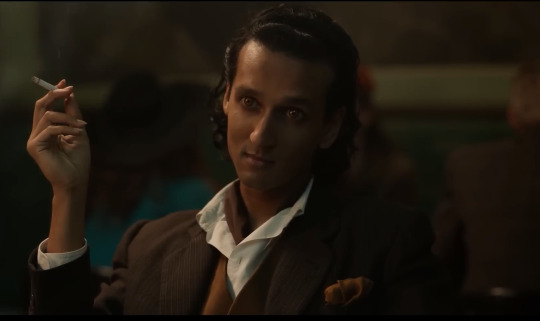
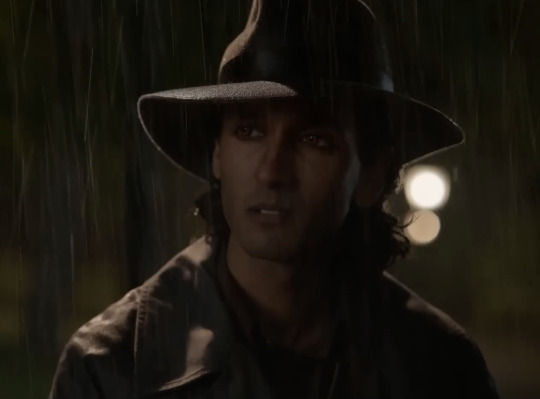
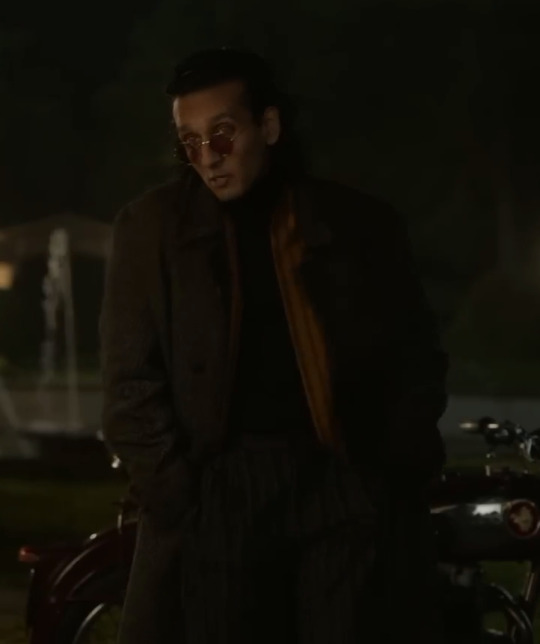

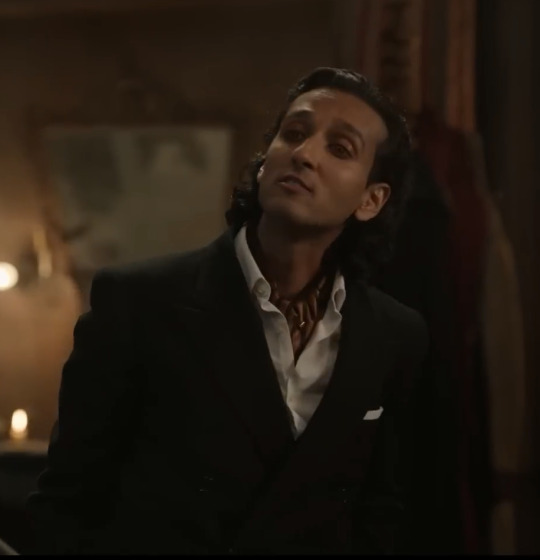

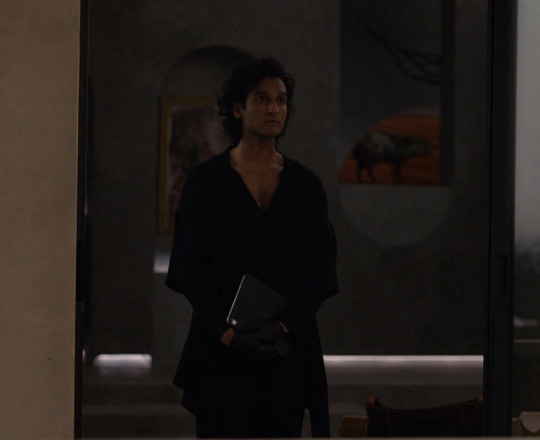
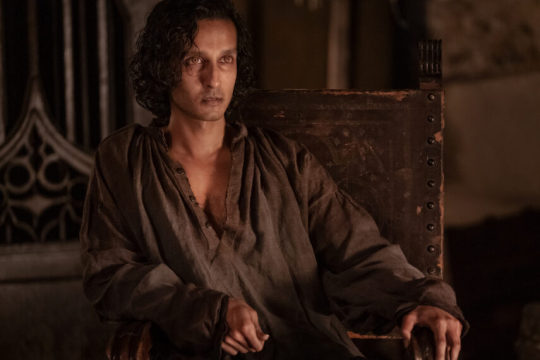
In the Roma culture referring to dead people by their name and showing their pictures is avoided. Traditionally the remaining family moves out from the house where they lived with the dead person, and the person’s belongings and images are burned or otherwise destroyed after their death (at least in Finland this is still sometimes done). It’s out of respect but I think it’s also a response to generations of trauma where there has been so much death and suffering that Roma people need to forget and move on so they can continue living. In the books Armand treats death in the same way; when he loses someone he stops talking about them, sometimes even thinking about them. When he’s abducted he doesn’t mention his father (who he assumes is dead) again and forgets even his own name, because the child he was before he was taken doesn’t exist anymore. Despite being so needy he often just leaves things behind and keeps on moving, like when he simply walked away from Louis. The Roma aren’t prone to nostalgia and they don’t like wallowing in the past or worrying about things that might or might not happen either, it’s all seen as a luxury they can't afford. It still doesn’t make it just disappear. The deep hidden sorrow that Armand and many other characters of the series always carry with them resonates with me as a Roma.
*
Lastly, I want to emphasize this is all just random theorizing and I’m happy regardless of whatever Armand’s background ends up being! I also know some Roma don’t want Roma portrayed in fiction made by non-Roma people at all because they don’t trust it to be done well. There’s also a problem with Roma characters usually being played by non-Roma. IWTV is an exception to me personally because I have an unusually high level of trust in this show’s writing, I love and relate to Armand’s character, and I think Assad Zaman looks like he could believably play a Roma man instead of the usual casting of a white person who looks ‘exotic’. However, like I said in the beginning there isn’t any proof Armand is actually going to be Roma and for now this is just headcanoning and speculation for fun. I also want to say that I hope I didn’t give an impression that Roma people’s life is like constant misery because that definitely isn’t true! There’s a tendency to see the Roma only through their problems when there are plenty of happy and successful Roma people and there has been improvement in the Roma people’s situation even though it’s slow. I also think one of the Roma people’s strengths has always been that they can find joy and humor even in hard circumstances.
If you got to this point I salute you thank you for reading!
#oh my god you’ve convinced me#im absolutely here for this and accepting this hc#interview with the vampire#iwtv#amc iwtv#armand#ive been considering what i think his ethnicity is on the show for a while as its very vague#but this? romani armand!! literally makes perfect sense as to WHY his identity is uncertain#need this actually#i live for characters with so many layers of meaning woven into their personal and cultural identities and im just. in love with this hc#amc PLEASE
80 notes
·
View notes
Text

the vampire almond
49 notes
·
View notes
Text
Dumb post canon armand comics part 2

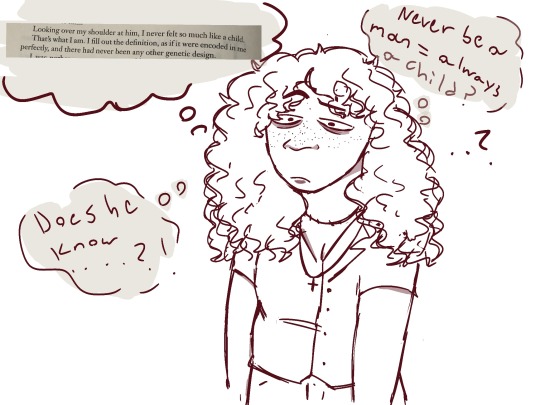

Based in my headcanon that since armand is described as hella androgynous and gets mistaken for a girl in canon I think that in the yr of our lord 2024 he’d probably be mistaken/perceived as transmasc often enough, which would lend itself to some confusing situations for Mr 500 yrs old. Bro thinks that he’s getting harassment for being eternally young bless his heart
27 notes
·
View notes
Photo



So I’ve been reading The Vampire Chronicles and have been super enjoying it so far. I love the disgusting drama these creatures get up to. While I’ve been busy at work I have had the time to sketch these out and today the studio was on break and I was able to color them all in one swoop.
It’s pencil plus a couple multiply/overlay layers in photoshop.
The order is:
Louis, Claudia, Lestat
Armand, Nicki, Gabrielle
Bianca, Marius, Santino.
I’m reading QotD next so expect Akasha soon, ohohoho….
1K notes
·
View notes
Text
we don’t give devils minion era Daniel enough credit bcus imagine ur boyfriend (who can kill you) has the emotional volatility of an ultra mentally ill teenager and u fight constantly and not only is this bitch prone to tantrum style throwing and breaking things when he’s angry, he can also *read your mind* and 100% is going to call u out and break down cry and scream etc over something you DIDN’T EVEN SAY OUT LOUD 😭😭 like omfg Daniel can have the most restraint in the world during an argument and his uncontrollable stream of consciousness is still going to get him in deep shit, it’s a miracle he fared as well as he did actually
#was going THROUGH IT#also of course devils minion WAS a toxic/abusive relationship but its also a fantastic metaphor for how they are irl#like having an abusive partner be shown as a LITERAL immature bloodsucker is heavy handed for how they are irl metaphorically#like the relationship is terrifying for good reason#but once again! it is anne rice none of these mfs are healthy so lets go#armandaniel#devils minion#tvc#the vampire chronicles
286 notes
·
View notes
Text
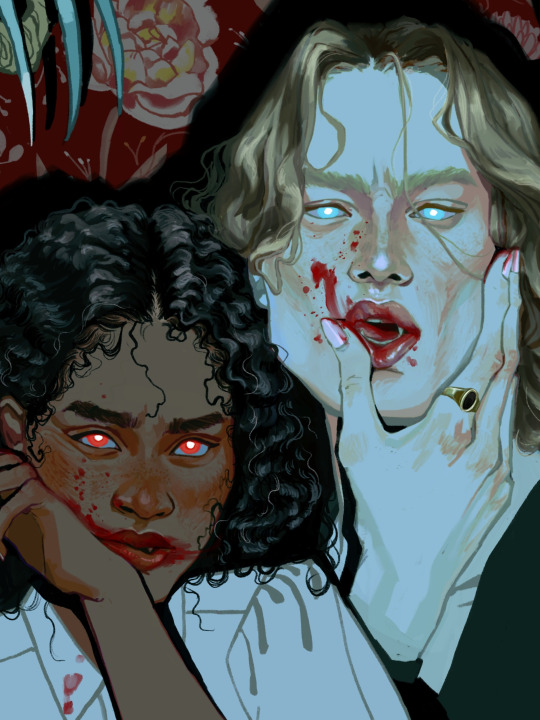
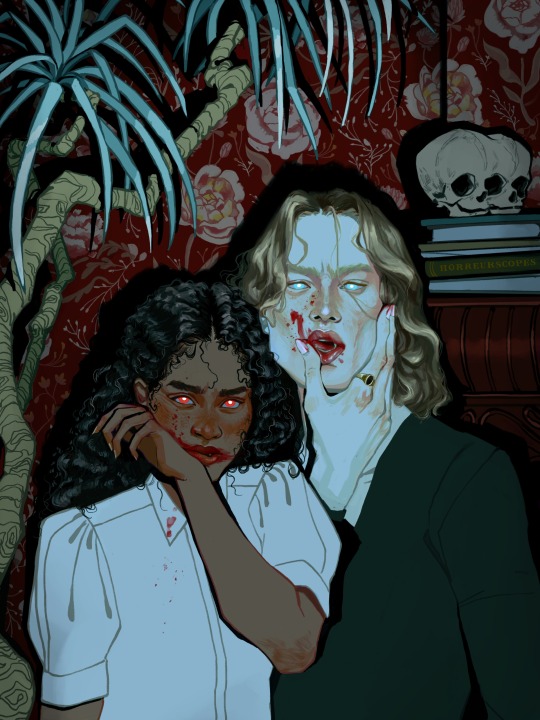
ELEKTRA: I am the shape you made me. Filth teaches filth.
(prints)(process video & high res)
31K notes
·
View notes
Text

#essentially!#lestat de lioncourt#interview with the vampire#iwtv#amc iwtv#tvc#the vampire chronicles
5K notes
·
View notes